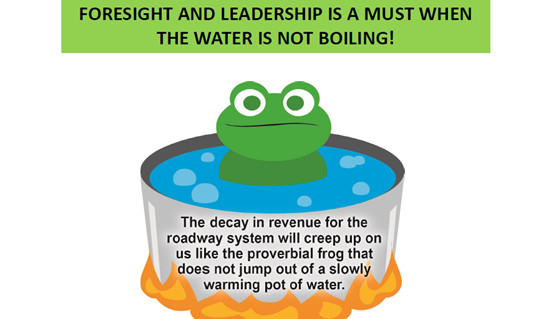
Road Use Charging Arrives in 2015
It may only be a 5,000-car pilot, but make no mistake, Oregon’s Road Use Charging program is the real deal and a harbinger of things to come. Oregon is recruiting drivers of MY2015 vehicles with 55 mpg fuel efficiency or better, according to http://roadchargeoregon.org/ to participate in the voluntary program which will replace gas taxes with a road use charge.
Oregon, like every other state in the U.S., is facing a highway funding crisis as cars become more fuel efficient and people get more miles while spending less on gas. As if that double-whammy weren’t enough of a hit to highway funds, fuel prices are spiraling downward and West Coast states already have the highest levels of EV ownership, approximately 1.9%.
Oregon's projections for gasoline consumption vs. vehicle miles driven.
In the U.S., Colorado, Nebraska, North Carolina, Virginia, and Washington currently charge an extra fee for electric cars. Wisconsin is considering joining this list and may also become the first state to tax hybrid vehicles. There is a clear sense of absurdity to a situation where the Federal government is offering a rebate on purchases of EVs while states impose a tax.
California, Oregon and Washington are seeking to avoid this absurdity while delivering a fiscally fair and responsible solution to the highway funding crisis.
The Oregon program will kick off on July 1 of 2015 with a per-mile charge, with mileage determined and reported by a device plugged into the vehicle. The state reserves the right to try a range of technological approaches in the future. Drivers participating in the program will see their retail gas taxes of about 30 cents/gallon rebated.
Device proposed for use in Oregon trial.
California’s legislature has passed a bill calling for an initial pilot of a similar program with a target of 15,000 participating vehicles by 2017. And Washington State is working together with California to coordinate the development of its own program.
Transportation authorities liken the impending highway funding crisis to a frog in a pot of water that is brought to a boil so slowly that the frog doesn’t realize, until too late, that it is in danger. But the proliferation of fuel efficient vehicles has become hard to ignore.
Advocates of the road charging program recognize the importance of protecting privacy and vehicle security as well as providing choice. Supporters of the road use charging program in California and Oregon emphasize that no vehicle owner will pay BOTH the gas tax AND the road use charge. The Oregon pilot is entirely voluntary and California will need to conduct research before preparing its own pilot.
All three states are considering the integration of usage-based insurance in their value proposition along with using the insured vehicle value to calculate the road use charge. Similarly, future programs can be expected to discriminate between the road use charge for a motorcycle and a heavy truck.
The annual payment is expected to be comparable to the existing annual payment for gas taxes, estimated to be $135 for the average driver. The integration of usage-based insurance means that car insurers could, for example, pay for the first 8,000 miles of road use.
These efforts echo a program launched in Milan in cooperation with Octo Telematics. The Milanese government is working with the public transport department, insurance agency Unipol and Octo Telematics on a program called "Park Your Car and Go Public!" Using a device installed in the cars of Unipol customers, city officials will reward drivers 1.5 Euro/day if the car remains parked from 7:30 AM to 7:30 PM. The payment covers the cost of public transportation.
The concern in Europe is focused on reducing congestion, which has given rise to so-called congestion charging in major cities such as London and Gothenburg. Congestion is an issue in the U.S. as well and the Octo-Unipol-Milan model may ultimately find a home in the U.S. as well.
Wireless carriers, telematics service providers, data clearinghouses and insurance companies are all watching developments closely with billions of dollars in revenue at stake. We are all facing the prospect of our driving experiences increasingly being metered and measured – as long as there is money in it, maybe we won’t mind. The current programs under consideration are entirely voluntary.


President at Magic Merchandising Inc. DBA Nate Einbund Marketing
9yDavid best of 2015 from Nate Einbund
Leader in economics and finance of transportation and technology
9yI like the Milan project with Octo: paying people not to drive is politically more attractive than congestion pricing and probably more cost effective as well. It does require attention to possible cheating.